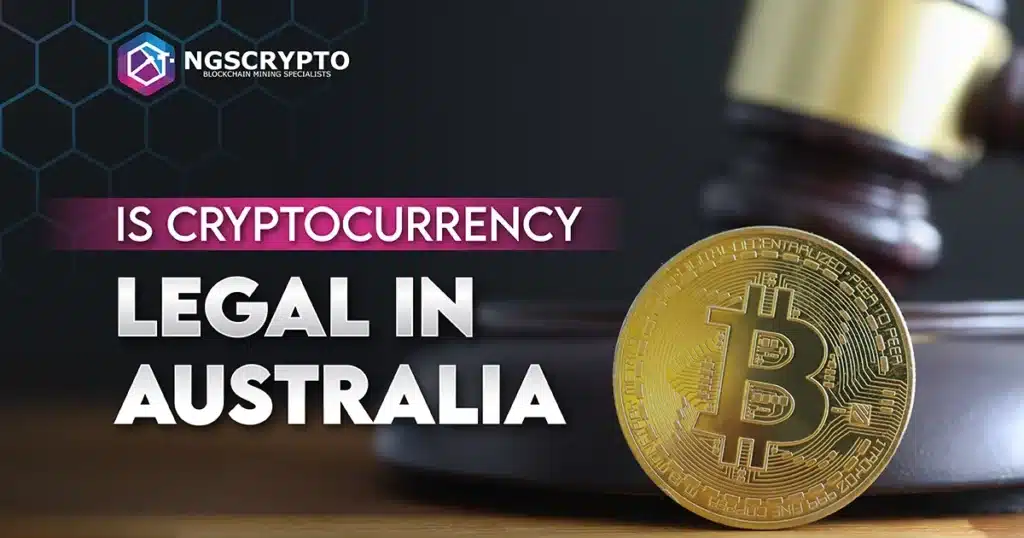NGS Crypto is an Authorised Reseller of NGS Group Blockchain Mining Packages
NGS Crypto is an Authorised Reseller of NGS Group Blockchain Mining Packages


Written by Katya Richardson
Share this article
Bitcoin and other digital currencies are currently the focal points of a transformative debate in Australia’s financial sector. This debate covers a range of topics from the regulatory approach, practical usage, and future prospects of cryptocurrencies. The legal standing of Bitcoin and other cryptocurrencies remains the top topic of curiosity, especially among those newly acquainted with the crypto world.
Cryptocurrencies, including Bitcoin, are legal in Australia and are categorised as property. Australians have the liberty to trade, spend, receive, and store these digital assets. Furthermore, they are accepted as a legitimate form of payment for both individual and business transactions.
This article aims to shed light on the continuously evolving legal framework and implications of Bitcoin and other cryptocurrencies in the Australian context.
While Australia does not yet have specific Bitcoin laws, some existing laws have been confirmed to apply to the crypto sector. Here are some legal frameworks in Australia about Crypto:
Australia has witnessed several milestones in recognizing Bitcoin as a legitimate and regulated form of digital currency. These milestones represent significant developments in the country’s approach to Bitcoin. Here is a summary of those milestones:
These milestones illustrate Australia’s ongoing journey in embracing Bitcoin and other crypto and regulating it to provide clarity and security for users and businesses.
In Australia, you’ve got the flexibility to use Bitcoin for a wide range of purchases. This covers buying items from online retailers, getting your hands on gift cards for major stores, reserving your travel and accommodations, enjoying a meal at specific restaurants (especially in popular areas such as Sydney, Melbourne and Brisbane), and contributing to various charitable causes.
Notably, certain educational institutions, legal and accounting firms, as well as entertainment providers, have embraced Bitcoin as a payment option. The landscape could well have expanded further checking out the latest information in directories, on business websites, and via cryptocurrency payment platforms. It’s also wise to consider the potential transaction fees and the cryptocurrency’s price volatility as you navigate this ever-evolving financial terrain.
As the application of Bitcoin grows, its potential for inclusion in investment portfolios has attracted considerable attention. For those who manage their superannuation funds, it’s important to navigate the legal considerations and opportunities available. This brings up an important question: Can SMSF invest in cryptocurrency? The answer lies in understanding the complex legalities and regulations surrounding such investments in Australia.
The Australian Taxation Office (ATO) has laid out clear guidelines regarding the taxation of income derived from digital assets. These taxation obligations can impact your profitability. For those considering this venture, a pertinent question might be: Is it worth mining crypto in Australia? Understanding the cost versus benefit, including tax implications, is essential.
Below, you’ll find a summary of the tax rates applicable to residents for income earned through crypto mining.
Australia Resident Tax Rates 2023-2024
| Income Thresholds | Rate | Tax Payable on This Income |
| 0 – $18,200 | 0% | Nil |
| $18,201 – $45,000 | 19% | 19 cents for each $1 over $18,200 |
| $45,001 – $120,000 | 32.5% | $5,092 plus 32.5 cents for each $1 over $45,000 |
| $120,001 – $180,000 | 37% | $29,467 plus 37 cents for each $1 over $120,000 |
| $180,001 – and over | 45% | $51,667 plus 45 cents for each $1 over $180,000 |
Australian tax residents have some breathing room thanks to a number of tax-free levels and allowances that thankfully apply to cryptocurrency as well.

In Australia, “legal tender” refers to a currency recognized by the government for settling financial obligations, with the Australian dollar (AUD) as the official choice for transactions. However, Bitcoin isn’t considered legal tender under Australian law. This means businesses aren’t legally required to accept it as payment, and creditors can decline it for debt settlement.
Bitcoin is not considered legal tender but instead, it is treated as a form of property rather than a traditional currency. This means that while Bitcoin is not officially recognized as a government-issued currency like the Australian dollar (AUD), it is still considered a legitimate asset. As such, it is subject to various laws and regulations governing its use, taxation, and exchange.
Those interested in the mining aspect of cryptocurrencies might also wonder: Is crypto mining illegal in Australia? It’s crucial to understand the legality to ensure that all crypto activities are above board.
These regulations provide legal clarity on how Bitcoin should be handled and accounted for in the context of financial transactions and taxation. It’s important for individuals and businesses using Bitcoin to understand and comply with these legal frameworks to ensure they operate within the bounds of the law.
In Australia, various official bodies oversee Bitcoin exchanges and cryptocurrency matters:
It’s important to note that the regulatory landscape for cryptocurrencies can change over time. Therefore, it’s advisable to stay updated with the latest regulatory developments and consult legal and compliance experts when engaging in cryptocurrency-related activities, including operating or using cryptocurrency exchanges.

Bitcoin is gaining ground in Australia as people are getting more familiar with it and the rules are getting clearer, making them feel more secure. Businesses are responding to the growing demand from customers who want to use Bitcoin for payments, so now you can use it in various places, from shops and restaurants to travel agencies.
It’s not just for big purchases; you can also use Bitcoin to send money to friends or shop online. However, it’s essential to be cautious because Bitcoin’s price can be quite volatile, and there are rules to follow, such as paying taxes on Bitcoin earnings and ensuring it’s not used for illegal activities.
Maintaining security and avoiding scams is also a top priority. As the rules become more refined and businesses become more comfortable with it, it’s likely that more Australians will embrace Bitcoin, aligning with the global trend of accepting digital assets as a legitimate financial option.
Consumer protection laws in Australia play a critical role in safeguarding individuals engaging with Bitcoin. These laws ensure that Bitcoin transactions are conducted fairly and transparently. Under these regulations, businesses must provide accurate and truthful information about Bitcoin, and consumers have the right to request refunds or returns if products or services purchased with Bitcoin do not meet specific quality standards.
Rules against unsolicited sales prevent misleading or aggressive sales tactics related to Bitcoin. Privacy laws apply to Bitcoin transactions, governing the handling and protection of personal information. The Electronic Transactions Act recognises Bitcoin as a valid form of electronic payment, while potential changes in payment system regulations could impact Bitcoin payments. Staying informed about regulatory updates is essential for both consumers and businesses to ensure compliance with these consumer protection laws in the context of Bitcoin transactions.
Australia’s regulatory approach to other cryptocurrencies, also known as altcoins, varies depending on the specific cryptocurrency and its use case. Here’s a brief discussion on the legality of other cryptocurrencies in Australia:
Australia’s future Bitcoin regulation looks very promising, with experts foreseeing increased adoption and government plans to refine rules. This includes clear guidelines for things like anti-money laundering and ensuring international compliance. There’s a focus on consumer protection and taxes to safeguard people. Australian financial institutions are likely to get more involved, offering more services related to Bitcoin. This aligns with global trends in the cryptocurrency world, showing that Australia is moving in step with the rest of the world.
Overall, the future of Bitcoin regulation in Australia is expected to be characterized by a dynamic regulatory landscape, with a focus on fostering innovation, protecting consumers, and collaborating with international counterparts to establish global standards.
Looking to translate your understanding of cryptocurrency’s legal standing into practical investment? Our guide How to Invest in Cryptocurrency Australia breaks down the steps for safe and legal investment in the crypto market.
In summary, Australia allows the use of cryptocurrencies (legal) but regulates them to prevent illegal activities, protect consumers, and ensure proper taxation. This includes rules against money laundering and terrorism financing, consumer protection measures, and tax guidelines.
As the cryptocurrency landscape evolves, it’s crucial for individuals and businesses to stay informed about Australian-specific legal updates. Staying updated ensures compliance and a secure path for engaging with Bitcoin or other crypto in Australia. It is also advisable to consult legal and compliance experts when engaging in cryptocurrency-related activities, including operating or using cryptocurrency exchanges.
The information presented on this website is general information only. It should not be taken as constituting professional advice from the website owner – NGS Crypto PTY LTD (NGS Crypto). Any information regarding past performance and returns contained on this website should not be construed or interpreted as a prediction or opinion as to future performance and returns. NGS Crypto is not a financial adviser. All views and observations expressed by NGS Crypto on this website are for information purposes only, are general in nature and should not be treated as investment or financial advice of any kind.
NGS Crypto is an authorised reseller of NGS Group blockchain mining packages. The information presented on this website (https://ngscrypto.com) is general information only. It should not be taken as constituting professional advice from the website owner – NGS Crypto PTY LTD (NGS Crypto). Any information regarding past performance and returns contained on this website should not be construed or interpreted as a prediction or opinion as to future performance and returns. NGS Crypto is not a financial adviser. All views and observations expressed by NGS Crypto on this website are for information purposes only, are general in nature and should not be treated as investment or financial advice of any kind. Before making an investment in crypto assets, you should consider seeking independent legal, financial, taxation or other such professional advice to check how the information on this website relates to your unique circumstances. NGS Crypto is not liable for any loss caused, whether due to negligence or otherwise arising from the use of, or reliance on, the information provided directly or indirectly, by use of this website. You can view our full terms & conditions by clicking here.
NGS Crypto is not affiliated, associated, authorized, endorsed by, or in any way officially connected with this NGS Super (ABN 73 549 180 515).
© 2024 NGS Crypto
NGS Crypto is an Authorised Reseller of NGS Group
| Cookie | Duration | Description |
|---|---|---|
| cookielawinfo-checkbox-analytics | 11 months | This cookie is set by GDPR Cookie Consent plugin. The cookie is used to store the user consent for the cookies in the category "Analytics". |
| cookielawinfo-checkbox-functional | 11 months | The cookie is set by GDPR cookie consent to record the user consent for the cookies in the category "Functional". |
| cookielawinfo-checkbox-necessary | 11 months | This cookie is set by GDPR Cookie Consent plugin. The cookies is used to store the user consent for the cookies in the category "Necessary". |
| cookielawinfo-checkbox-others | 11 months | This cookie is set by GDPR Cookie Consent plugin. The cookie is used to store the user consent for the cookies in the category "Other. |
| cookielawinfo-checkbox-performance | 11 months | This cookie is set by GDPR Cookie Consent plugin. The cookie is used to store the user consent for the cookies in the category "Performance". |
| viewed_cookie_policy | 11 months | The cookie is set by the GDPR Cookie Consent plugin and is used to store whether or not user has consented to the use of cookies. It does not store any personal data. |